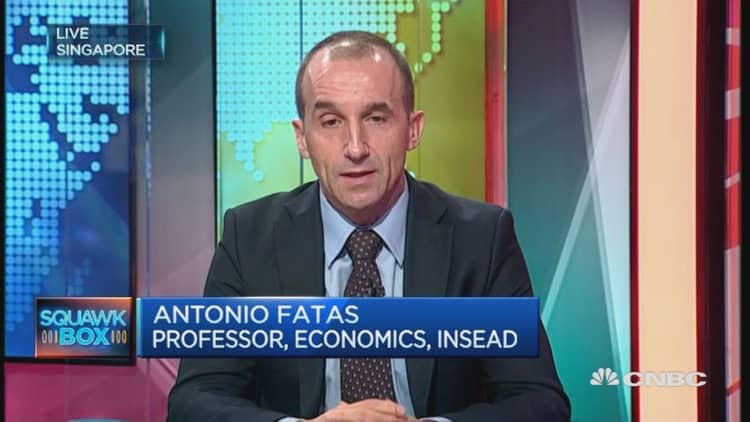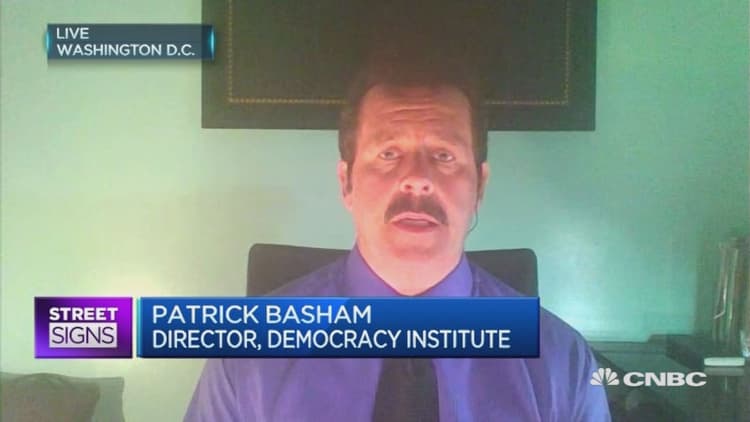Markets are likely to be skittish this week ahead of the June 23 referendum vote in the United Kingdom (U.K.), where Britons would decide either to remain or leave the European Union (EU).
Weekend polls showed the remain camp gained a narrow lead; a YouGov poll for The Sunday Times newspaper published at the weekend showed 44 percent supported remaining in the EU versus 43 percent who supported leaving, based on interviews conducted on Thursday and Friday. Two other polls also showed public opinion tilted towards the remain camp.
Global stock markets struggled to eke out gains last week; the lost 1.07 percent for the week, its worst performance since the one ended May 13. The S&P 500 index lost 1.19 percent for the week, while the composite dropped 1.92 percent for the week.
"The agitation in financial markets reflects two things," said Shane Oliver, head of investment strategy and chief economist at AMP Capital, in a Friday note. First, he said, there were worries about the impact of a Brexit on the U.K. economy due to reduced trade access to the EU, uncertainty over London's future as a financial sector, and labor mobility.
But "the real concern globally is that a Brexit could lead to renewed worries about the durability of the euro, to the extent that it may encourage moves by euro zone countries to exit the EU and eurozone," said Oliver.




That would in turn reignite concerns about the credit worthiness of debt issued by peripheral countries and lead to a flight to safety out of the euro into the dollar, putting renewed pressure on emerging market currencies, the yuan and commodity prices, Oliver warned.
Campaigning on the referendum issue was halted Thursday, after a pro-EU British lawmaker, Jo Cox, was killed while meeting constituents. A 52-year-old man, Thomas Mair, has been charged with Cox's murder. Some analysts told CNBC on Friday the event might change the psychology of the campaign.
Market volatility in recent days has seen investors flock to safe-haven assets such as bonds, causing yields around the world to slide, some to record lows. Yield on the U.K.'s 10-year gilt briefly fell to a record low of 1.072 percent Thursday, while the German 10-year bund briefly dropped to a record low of around negative 0.0380 percent Thursday after turning negative for the first time ever on Tuesday morning.
If the leave camp wins, the process of negotiating a British exit from the EU would begin, but talks could take more than two years.
Analysts at RBC Capital Markets said in a June 15 note that a Brexit vote could see the gilt and the bund markets rally, but for different reasons.
"Gilts should rally due to expectations of bank rate cuts 'towards zero' and another round of quantitative easing coupled with a drop in inflation expectations," the RBC Capital Markets analysts said. "Bunds are likely to be driven by a different force, namely a renewed flight to safety."
Meanwhile, the British pound traded at $1.4569 on Monday morning Asia time, up from levels near $1.40 on Thursday. The euro traded at $1.1348.
A Brexit vote could also have political implications according to National Australia Bank (NAB) analysts, who pointed out in a note on Friday that in the event of a Brexit, "chances are that [Prime Minister] David Cameron will have to resign."
Cameron has campaigned for the U.K. to remain in the EU and previously warned in an interview with The Observer newspaper that an exit from EU would put British state pension increases and ring-fenced health spending in danger.
"If so, Britain's notice of EU membership withdrawal could be delayed until after a new prime minister is announced, with the process potentially dragging on all the way into autumn," the NAB analysts added. "Bias would be for the Brexit process to be completed ahead of the next general election, meaning that a likely deadline for giving notice of withdrawal would be 31 December 2016, with exit completed by the end of 2018."
On tap this week:
Monday, June 20
Japan - May trade data
Tuesday, June 21
Australia - Reserve Bank of Australia meeting minutes
Wednesday, June 22
Thailand - Bank of Thailand monetary policy decision
Thursday, June 23
U.K. - EU referendum vote
Friday, June 24
Results of U.K. - EU referendum vote


